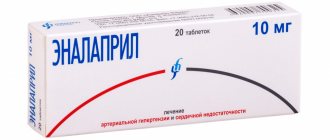Renipril®
Caution must be exercised when prescribing Renipril® to patients with reduced circulating blood volume (as a result of diuretic therapy, limiting salt intake, hemodialysis, diarrhea and vomiting) - the risk of a sudden and pronounced decrease in blood pressure is increased after using even the initial dose of an ACE inhibitor. Transient arterial hypotension is not a contraindication for continuing treatment with the drug after stabilization of blood pressure. In case of a repeated pronounced decrease in blood pressure, the dose should be reduced or the drug discontinued.
The use of high-permeability dialysis membranes increases the risk of developing an anaphylactic reaction. Correction of the dosage regimen on days free from dialysis should be carried out depending on the level of blood pressure.
Before and during treatment with ACE inhibitors, periodic monitoring of blood pressure, blood parameters (concentration of hemoglobin, potassium, creatinine, urea, liver enzyme activity), and protein in the urine is necessary.
Patients with severe heart failure, coronary heart disease and cerebrovascular disease, in whom a sharp decrease in blood pressure can lead to myocardial infarction, stroke or impaired renal function, should be carefully monitored.
Sudden cessation of treatment does not lead to withdrawal syndrome (a sharp rise in blood pressure).
For newborns and infants who have been exposed in utero to ACE inhibitors, it is recommended to conduct careful monitoring for timely detection of a pronounced decrease in blood pressure, oliguria, hyperkalemia and neurological disorders that may be due to a decrease in renal and cerebral blood flow with a decrease in blood pressure caused by ACE inhibitors. In oliguria, it is necessary to maintain blood pressure and renal perfusion by administering appropriate fluids and vasoconstrictors.
Before studying the functions of the parathyroid glands, the drug should be discontinued. Alcohol enhances the hypotensive effect of the drug.
Before surgery (including dentistry), the surgeon/anesthesiologist must be warned about the use of ACE inhibitors.
In the presence of renal failure, the excretion of the active metabolite may be reduced, leading to an increase in its concentration in the blood plasma. Such patients may need to be prescribed smaller doses of the drug.
In patients with arterial hypertension and unilateral or bilateral renal artery stenosis, an increase in urea and creatinine in the blood serum is possible.
In such patients, renal function should be monitored during the first few weeks of therapy. It may be necessary to reduce the dosage of the drug.
The balance of risk and potential benefit should be taken into account when prescribing Renipril® to patients with coronary and cerebrovascular insufficiency due to the risk of increased ischemia with excessive arterial hypotension.
The drug should be prescribed with caution to patients with diabetes mellitus due to the risk of developing hyperkalemia.
Patients with a history of angioedema may have an increased risk of developing angioedema during treatment with Renipril.
Patients with significant autoimmune diseases, such as systemic lupus erythematosus or scleroderma, are at increased risk of developing neutropenia or agranulocytosis while taking Renipril®.
Caution is recommended when prescribing Renipril® for the treatment of chronic heart failure in patients receiving cardiac glycosides and/or diuretics.
Renipril
Caution must be exercised when prescribing the drug to patients with reduced blood volume (as a result of diuretic therapy, limiting salt intake, hemodialysis, diarrhea and vomiting) - there is an increased risk of a sudden and pronounced decrease in blood pressure after using even the initial dose of an ACE inhibitor. Transient hypotension is not a contraindication for continuing treatment with the drug after stabilization of blood pressure. In case of a repeated pronounced decrease in blood pressure, the dose should be reduced or the drug discontinued.
If an excessive decrease in blood pressure develops, the patient is transferred to a horizontal position with a low head, and, if necessary, a 0.9% NaCl solution and plasma-substituting drugs are administered.
The use of high-flow dialysis membranes increases the risk of developing an anaphylactic reaction. Correction of the dosage regimen on days free from dialysis should be carried out depending on the level of blood pressure.
Before and during treatment with ACE inhibitors, it is necessary to monitor blood pressure, blood parameters (Hb, K+, creatinine, urea, liver enzyme activity), and protein in the urine.
Patients with decompensated CHF, ischemic heart disease and cerebral vascular diseases, in whom a sharp decrease in blood pressure can lead to myocardial infarction, stroke or impaired renal function, should be carefully monitored. Sudden cessation of treatment does not lead to withdrawal syndrome (a sharp rise in blood pressure).
Patients with a history of angioedema have an increased risk of developing it when taking ACE inhibitors.
For newborns and infants who have been exposed in utero to ACE inhibitors, it is recommended to conduct careful monitoring for timely detection of a pronounced decrease in blood pressure, oliguria, hyperkalemia and neurological disorders that may be due to a decrease in renal and cerebral blood flow with a decrease in blood pressure caused by ACE inhibitors. With oliguria, it is necessary to maintain blood pressure and renal perfusion by administering appropriate fluids and vasoconstrictor drugs.
In patients with reduced renal function, the single dose should be reduced or the intervals between doses should be increased.
Before studying the functions of the parathyroid glands, enalapril should be discontinued.
Caution should be exercised when performing physical exercise or in hot weather (risk of dehydration and excessive reduction in blood pressure due to a decrease in blood volume).
Before surgery (including dentistry), the surgeon/anesthesiologist must be warned about the use of ACE inhibitors.
During treatment with the drug, care must be taken when driving vehicles and engaging in other potentially hazardous activities that require increased concentration and speed of psychomotor reactions (dizziness is possible, especially after taking the initial dose of an ACE inhibitor in patients taking diuretic drugs).
Enalapril+Hydrochlorothiazide Renipril GT tablet 12.5 mg+10 mg x20
Trade name: Renipril HT International name: Hydrochlorothiazide + Enalapril
Release form: tablets (blister packs)
Composition: enalapril maleate 10 mg, hydrochlorothiazide 12.5 mg
Pharmacological group: combined antihypertensive drug (ACE inhibitor + diuretic)
Pharmacological group according to ATK: C09BA02 (Enalapril in combination with diuretics)
Pharmacological action: vasodilating, hypotensive, diuretic, ACE blocking,
Indications: Arterial hypertension, CHF.
Dosage regimen: Orally, regardless of food intake, 1-2 tablets 1 time per day (in patients with a decrease in glomerular filtration to 30 ml/min, individual dose selection is required, in terms of enalapril - 5-10 mg/day).
Contraindications: Hypersensitivity (including to other sulfonamide derivatives), anuria, history of angioedema associated with taking ACE inhibitors, hereditary or idiopathic angioedema
pregnancy, lactation period, childhood.
Side effects: Most often: dizziness, increased fatigue.
1-2%: muscle cramps, nausea, asthenia, orthostatic hypotension, headache, cough, impotence.
From the cardiovascular system: fainting, decreased blood pressure, palpitations, tachycardia, chest pain.
Allergic reactions: angioedema (face, tongue, lips, vocal cords, larynx, extremities, intestines), malignant exudative erythema (Stevens-Johnson syndrome).
From the nervous system: dizziness, insomnia or drowsiness, paresthesia, increased excitability.
From the respiratory system: shortness of breath.
From the digestive system: dry mouth, dyspepsia (including nausea, vomiting, flatulence), diarrhea or constipation, abdominal pain, pancreatitis.
From the genitourinary system: impaired renal function, renal failure, decreased libido.
From the skin: skin rash, itching, sweating.
Laboratory indicators: hyperglycemia, hyper- or hypokalemia, increased urea concentration in blood serum, hypercreatininemia, hyperuricemia, increased activity of “liver” transaminases, hyperbilirubinemia, decreased Hb and hematocrit.
Other: gout, tinnitus, arthralgia, lupus-like syndrome (fever, serositis, vasculitis, myalgia/myositis, arthralgia/arthritis, positive test for antinuclear antibodies, increased ESR, eosinophilia, leukocytosis, skin rash, photosensitivity).
Overdose Symptoms: excessive decrease in blood pressure up to the development of collapse, myocardial infarction, acute cerebrovascular accident or thromboembolic complications, convulsions, stupor. Treatment: gastric lavage, ingestion of saline solution, intravenous administration of plasma substitutes, angiotensin II, hemodialysis (excretion rate - 62 ml/min).
Pharmacodynamics: A combined drug, the effect of which is determined by the components included in its composition, has a hypotensive effect. Hydrochlorothiazide is a medium-strength diuretic that increases urinary excretion of Na+, Cl-, water, and bicarbonate. A decrease in Na+ concentration in the wall of blood vessels leads to their dilatation and reduces sensitivity to vasoconstrictor factors. Enalapril inhibits ACE, which promotes the conversion of angiotensin I to angiotensin II, reduces the concentration of aldosterone in the blood, increases the release of renin, improves the functioning of the kallikrein-kinin vasodepressive system, stimulates the release of Pg and venous endothelial relaxing factor, and inhibits the sympathetic nervous system. Together, these effects eliminate spasm and dilate peripheral arteries, reduce peripheral vascular resistance, systolic and diastolic blood pressure, post- and preload on the myocardium.
Hydrochlorothiazide reduces the level of K+ in the blood, enalapril causes its delay, and when these drugs are used together, normal maintenance of the concentration of K+ in the blood is ensured.
Special instructions: Therapy should be discontinued before testing the function of the parathyroid glands. Subject to dialysis. Dosage adjustments on days when dialysis is not performed should be based on blood pressure levels. Before and during treatment, monitoring of blood pressure, renal function, and plasma K+ concentration is necessary.
Caution must be exercised when prescribing to patients with reduced blood volume (as a result of diuretic therapy, limiting salt intake, hemodialysis, diarrhea and vomiting) due to the increased risk of sudden hypotension after using even the initial dose. Transient hypotension is not a contraindication for continuing treatment with the drug after stabilization of blood pressure. If severe hypotension reoccurs, the dose should be reduced or the drug discontinued.
In case of excessive hypotension, the patient is transferred to a horizontal position with a low head, and, if necessary, a 0.9% NaCl solution is administered (to increase plasma volume). Patients with decompensated CHF, ischemic heart disease and cerebral vascular diseases should be monitored, in whom a sharp decrease in blood pressure can lead to myocardial infarction or stroke, or impaired renal function.
The use of AN69 dialysis membranes in combination with ACE inhibitors is not recommended.
With caution Renal/liver failure, severe systemic connective tissue diseases (including SLE, scleroderma), bilateral renal artery stenosis, stenosis of the artery of a single kidney, condition after kidney transplantation, aortic stenosis, CHF, coronary artery disease, suppression of bone marrow hematopoiesis, cerebrovascular diseases (including cerebrovascular insufficiency), diabetes mellitus, hyperkalemia, Na+-restricted diet, conditions accompanied by a decrease in blood volume (including diarrhea, vomiting), old age.
Interaction: The hypotensive effect is reduced by NSAIDs, estrogens, ethanol, increased by diuretics, drugs for general anesthesia, antihypertensive drugs, hemodialysis.
Immunosuppressants, allopurinol, and cytostatics increase the risk of developing hematotoxicity.
Enhances the effect of ethanol and slows down the excretion of Li+.
Simultaneous administration with beta-blockers and BMCC increases the risk of developing hypotension.
Drug registration number: P No. 000156/01
Date of registration (re-registration) of the drug: November 25, 2004
ENALAPRIL
special instructions
The issue of using dual blockade of the RAAS (for example, by simultaneous use of an ACE inhibitor with an angiotensin II receptor antagonist) must be decided on a case-by-case basis with careful monitoring of renal function.
Caution must be exercised in patients with reduced blood volume (including when used simultaneously with diuretics, in conditions of limited salt intake, with hemodialysis, diarrhea, vomiting), in whom a sudden and pronounced decrease in blood pressure may develop in response to the use of an ACE inhibitor. In patients with mild CHF, with or without chronic renal failure, symptomatic hypotension is usually not observed. The development of arterial hypotension is most likely in patients with more severe CHF due to the use of high doses of diuretics, hyponatremia or functional renal failure. In these patients, treatment should begin under medical supervision until the optimal dose adjustment of Enalapril and/or diuretic is achieved. Similar tactics can be applied to patients with coronary artery disease and cerebrovascular diseases, in whom an excessive decrease in blood pressure can lead to myocardial infarction or cerebrovascular accident. If severe arterial hypertension develops, the patient must be placed in a horizontal position and, if necessary, an intravenous infusion of 0.9% sodium chloride solution should be started. Transient arterial hypotension is not a contraindication for continuing treatment with Enalapril after stabilization of blood pressure and replenishment of blood volume. In some patients with CHF with normal or low blood pressure, an additional decrease in blood pressure may occur when using the drug Enalapril. This is usually not a reason to discontinue the drug. In case of development of arterial hypotension, it is necessary to reduce the dose and/or discontinue the diuretic and/or enalapril.
As with all vasodilators, ACE inhibitors should be used with caution in patients with left ventricular hypertrophy and valvular obstruction and should be avoided in cases of cardiogenic shock and hemodynamically significant obstruction. In case of impaired renal function (creatinine clearance less than 80 ml/min), careful monitoring of potassium and creatinine levels in the blood serum is necessary. In patients with renal failure, it may be necessary to reduce the dose and/or frequency of dosing. Some patients with bilateral renal artery stenosis or arterial stenosis of a solitary kidney experience increased serum urea and creatinine concentrations. The changes are usually reversible and return to normal after stopping treatment.
In some patients who did not have renal disease before treatment, slight and transient increases in serum urea and creatinine concentrations were observed when enalapril was used concomitantly with diuretics. In such cases, it may be necessary to reduce the dose and/or discontinue enalairil and/or diuretic.
In patients with bilateral renal artery stenosis or stenosis of the artery of a solitary kidney taking ACE inhibitors. there is an increased risk of developing arterial hypotension and renal failure. Only moderate changes in plasma creatinine concentration can indicate a decrease in renal function. In such patients, treatment should begin with small doses under medical supervision, gradually selecting an individual dose and monitoring the concentration of creatinine in the blood serum.
There is no experience with the use of enalapril in patients who have recently undergone kidney transplantation. Therefore, the use of this drug in such patients is not recommended.
The use of Enalapril in patients with liver failure usually does not require dose adjustment. Rarely, taking an ACE inhibitor is associated with a syndrome ranging from the development of cholestatic jaundice to the development of fulminant liver necrosis. If symptoms of jaundice or increased liver enzyme activity occur in patients taking ACE inhibitors, discontinue drug therapy and conduct appropriate evaluation. Cases of neutropea/agranulocytosis, thrombocygopenia and anemia have been reported in patients taking ACE inhibitors. In patients with normal renal function and no other complications, neugropenia rarely develops. The drug Enalapril should be used with great caution in patients with connective tissue diseases (including systemic lupus erythematosus, scleroderma) who are simultaneously receiving immunosuppressive therapy, allopurinol or procainamide, as well as a combination of these factors, especially with existing renal dysfunction. These patients may develop severe infections that do not respond to intensive antibiotic therapy. If patients still take the drug Enalapril, it is recommended to periodically monitor the number of leukocytes in the blood. The patient should be warned that if any signs of infection appear, they should consult a doctor.
Angioedema of the face, extremities, tongue, vocal cords and/or larynx has been reported with the use of ACE inhibitors, including enalapril. This can happen at any time during treatment. In such cases, treatment with Enalapril should be stopped immediately, and the patient should be under medical supervision until the corresponding symptoms completely disappear. Even in cases where only difficulty in swallowing occurs without difficulty breathing, patients may require long-term medical observation because Therapy with antihistamines and glucocorticosteroids may not be enough. Angioedema, associated with swelling of the larynx and tongue, can be fatal in very rare cases. Patients with swelling of the tongue, vocal cords, or larynx may develop airway obstruction, especially in patients with a history of respiratory surgery. In cases of airway obstruction, it is necessary to carry out appropriate therapy as soon as possible, including subcutaneous administration of epinephrine (0.3-0.5 ml of epinephrine (adrenaline) solution in a ratio of 1:1000) and/or take the necessary measures to ensure the conductivity of the airways ( intubation or tracheostomy).
Among black patients receiving ACE inhibitor therapy, the incidence of angioedema is higher than among patients of other races. Patients with a history of angioedema not associated with the use of ACE inhibitors have an increased risk of developing angioedema when taking any ACE inhibitor.
There are reports of life-threatening anaphylactic reactions in patients taking ACE inhibitors. during the desensitization procedure with hymenoptera venom. Such reactions can be avoided if you temporarily stop taking ACE inhibitors before desensitization begins. The use of ACE inhibitors should be avoided in patients receiving bee venom immunotherapy.
In rare cases, life-threatening anaphylactoid reactions have been observed in patients taking ACE inhibitors during LDL apheresis with dextrin sulfate. If LDL-afsrez is used, AIF inhibitors should be temporarily replaced with other drugs to treat hypertension and heart failure.
Anaphylactoid reactions have been reported in patients undergoing hemodialysis using high-flux polyacrylonitrile membranes (AN69). In these cases, it is recommended to use a different type of membrane for dialysis or use an antihypertensive drug of a different pharmacotherapeutic group.
When using Enalapril in patients with diabetes mellitus receiving oral hypoglycemic agents or insulin, blood glucose concentrations should be regularly monitored during the first month of therapy. Cough has been reported with the use of ACE inhibitors. Usually the cough is non-productive and persistent and stops after discontinuation of ACE inhibitors. In the differential diagnosis of cough, cough caused by the use of ACE inhibitors must also be taken into account.
In patients undergoing surgery or during general anesthesia with drugs that cause hypotension, ACE inhibitors may block the formation of angiotensin II in response to compensatory release of renin. Before surgery (including dental procedures), it is necessary to warn the surgeon-anesthesiologist about the use of Enalapril.
Hyperkalemia may develop during therapy with ACE inhibitors, including enalapril. Risk factors for hyperkalemia include renal failure, | old age (over 65 years), diabetes mellitus, some concomitant conditions (decrease in BCC, acute heart failure in the stage of decompensation, metabolic acidosis), simultaneous use of potassium-sparing diuretics (such as spironolactone, eplerenone, triamterene, amiloride), as well as potassium supplements or potassium-containing substitutes for table salt and the use of other drugs that increase the content of potassium in the blood plasma (for example, heparin). The use of potassium supplements, potassium-sparing diuretics or potassium-containing table salt substitutes, especially in patients with renal failure, can lead to a significant increase in plasma potassium levels. Hyperkalemia can cause serious heart rhythm disturbances, sometimes fatal. The simultaneous use of Enalairil with any of the drugs listed above should be carried out with caution and should be accompanied by regular monitoring of potassium levels in the blood plasma. The simultaneous use of lithium and Enalapril is usually not recommended.
The drug Enalapril, like other ACE inhibitors, has a less pronounced antihypertensive effect in patients of the Negroid race compared to representatives of other races. possibly due to low renin activity in hypertensive patients in this population.
Sudden cessation of enalapril does not lead to the development of withdrawal syndrome.



